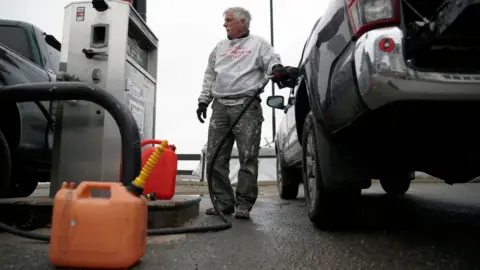Who wins and who loses when oil prices fall?
 Getty Images
Getty ImagesA slump in oil prices is normally a cause for celebration in gas-guzzling nations. The average American burns through 10 litres of oil or oil products per day in normal times.
But for oil producing countries - the "global petropolis" - such a drop in the cost of crude can spell disaster, and hardship for millions.
It's easy to see why oil is referred to as black gold. When the price was riding high, oil revenues filled the coffers of companies and governments in the countries that produce it. That kept people fed and public services flourishing.
But now, having oil can be a curse rather than a blessing.
The International Energy Agency previously warned that Ecuador, Nigeria and Iraq could be worst hit, with earnings falling by between 50% and 85% - and that was assuming oil prices of $30 a barrel. Now, it's less than $20 a barrel.
All their economies were under pressure already, all are heavily dependent on oil.
Fuel accounts for 98.5% of Iraq's export earnings (gems, precious metals, fruit and nuts make up most of the rest). The agency claims Iraq's government will now face a $50bn spending shortfall for the year, even if it were to only pay its civil servants, rendering spending on areas like healthcare vulnerable at the worst possible time.
How much a country spends on producing oil also dictates its vulnerability. Saudi Arabia has one of the lowest bills for extracting oil - but its dependence on the commodity means it too could face a funding shortfall of over $100bn. It's still recovering from the last major drop in oil prices in 2014. Attempts to push into areas such as tourism were insufficient to plug the gap.
 Getty Images
Getty ImagesIt needs the oil price to be around $85 a barrel to balance the books on government spending.
Ironically, it was Saudi that accelerated the oil price volatility by threatening to boost production to punish its rival Russia - a country which is far less vulnerable to swings in the price of crude.
President Trump has weighed in to promise support to the US oil and gas industry (in addition to the $650bn of subsidies the fossil fuel sector already gets). While it is the issues of storage and distribution there that have caused such a marked swing in the West Texas Intermediate measure of prices, oil production makes up a far lesser proportion of the US economy than in many other nations. And that makes the US less vulnerable.
The lower price is, in theory, a bonus to its drivers and factories - and to those elsewhere. Typically, countries that are net users would stand to enjoy a boost - but that is very muted for most at present, given restrictions on movements and production.
But it'll benefit oil's biggest customer, China, which accounts for a fifth of imports and is reportedly stockpiling bargain-basement crude as it fires up its production lines again.
On the whole, as the oil price has dropped, the risk of deeper recessions for producers has grown. However, if sustained, the fall could help the recovery in other nations further down the road.
